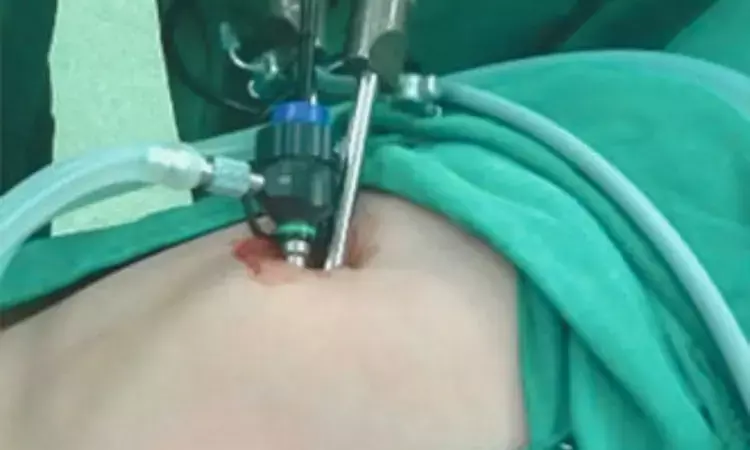- Home
- Medical news & Guidelines
- Anesthesiology
- Cardiology and CTVS
- Critical Care
- Dentistry
- Dermatology
- Diabetes and Endocrinology
- ENT
- Gastroenterology
- Medicine
- Nephrology
- Neurology
- Obstretics-Gynaecology
- Oncology
- Ophthalmology
- Orthopaedics
- Pediatrics-Neonatology
- Psychiatry
- Pulmonology
- Radiology
- Surgery
- Urology
- Laboratory Medicine
- Diet
- Nursing
- Paramedical
- Physiotherapy
- Health news
- Fact Check
- Bone Health Fact Check
- Brain Health Fact Check
- Cancer Related Fact Check
- Child Care Fact Check
- Dental and oral health fact check
- Diabetes and metabolic health fact check
- Diet and Nutrition Fact Check
- Eye and ENT Care Fact Check
- Fitness fact check
- Gut health fact check
- Heart health fact check
- Kidney health fact check
- Medical education fact check
- Men's health fact check
- Respiratory fact check
- Skin and hair care fact check
- Vaccine and Immunization fact check
- Women's health fact check
- AYUSH
- State News
- Andaman and Nicobar Islands
- Andhra Pradesh
- Arunachal Pradesh
- Assam
- Bihar
- Chandigarh
- Chattisgarh
- Dadra and Nagar Haveli
- Daman and Diu
- Delhi
- Goa
- Gujarat
- Haryana
- Himachal Pradesh
- Jammu & Kashmir
- Jharkhand
- Karnataka
- Kerala
- Ladakh
- Lakshadweep
- Madhya Pradesh
- Maharashtra
- Manipur
- Meghalaya
- Mizoram
- Nagaland
- Odisha
- Puducherry
- Punjab
- Rajasthan
- Sikkim
- Tamil Nadu
- Telangana
- Tripura
- Uttar Pradesh
- Uttrakhand
- West Bengal
- Medical Education
- Industry
Factors that may Influence HRQoL and recovery after Appendectomy, reveals research

Researchers have found in a new study that Perioperative factors like age, gender, smoking, education, and pre-hospital delay significantly may affect pain and health-related quality of life (HRQoL) after appendectomy. Worse outcomes in females, older adults, and those with delayed presentation emphasize the need for tailored care. Integration of mental health support and early intervention strategies is crucial for optimizing recovery and reducing complications.
Acute appendicitis is one of the most common surgical emergencies, predominantly affecting young adults who form the backbone of the workforce. While its diagnosis and treatment are well-studied, limited research exists on the perioperative factors affecting post-operative outcomes and health-related quality of life in resource-limited settings like Palestine. Understanding these factors is essential to enhance patient care and recovery.
This prospective, single-center observational study was conducted at Secondary Surgical Hospital, Nablus, Palestine, from April 2021 to February 2022. Patients aged ≥ 18 years diagnosed with acute appendicitis and treated surgically were included. Data were collected using structured forms covering preoperative (sociodemographics, clinical characteristics, imaging, and laboratory findings), intraoperative (timing, technique, and surgical findings), and postoperative (pain using Visual Analogue Scale), complications, and Health-Related Quality of Life using European Quality of Life-5 Dimensions-3 Levels variables. Follow-ups were conducted at discharge, one week, and two weeks post-surgery. Statistical analyses were performed using SPSS, with p < 0.05 considered significant.
Results: Ninety-three patients participated, with a mean age of 31.14 years (63.4% ≤ 31 years, 65.6% male). Sociodemographic factors, including smoking (41.9%), educational level (76.4% grade 12 or less), and COVID-19 history (18.3%), were significantly associated with post-operative outcomes. Complicated appendicitis was observed in 43.3% of cases, particularly in older patients and those with delayed presentation (> 48 h, 16.3%). Pain was assessed postoperatively with scores that were significantly higher in females (VAS > 7, p < 0.001) and showed gradual improvement within 24 h post-surgery. Health-Related Quality of Life improved significantly over two weeks, with the European Quality of Life-5 Dimensions-3 Levels index rising from 0.569 at discharge to 0.827 at two weeks. Gender, age, and delayed presentation were strongly associated with worse outcomes, including increased anxiety, reduced mobility, and prolonged recovery.
Perioperative factors such as age, gender, smoking, educational level, and pre-hospital delay significantly impact pain and HRQoL after appendectomy. Females and older patients experienced worse outcomes, highlighting the need for tailored care. These findings underscore the importance of addressing sociodemographic disparities and optimizing perioperative management. Tailored surgical planning should prioritize early intervention in high-risk groups such as females, older adults, and patients with delayed presentation to reduce complications and improve recovery. Furthermore, the significant role of anxiety and depression in post-operative outcomes suggests that stress-reduction strategies and mental health support should be integrated into patient care. Future research should aim for longer follow-up and broader populations to establish more comprehensive post-appendectomy care guidelines.
Reference:
Zayed, A., Demyati, K., Alkaiyat, A. et al. Perioperative factors influencing post-appendectomy outcomes in adults: a single-center prospective study in the North of Palestine. BMC Surg 25, 290 (2025). https://doi.org/10.1186/s12893-025-03007-3
Dr. Shravani Dali has completed her BDS from Pravara institute of medical sciences, loni. Following which she extensively worked in the healthcare sector for 2+ years. She has been actively involved in writing blogs in field of health and wellness. Currently she is pursuing her Masters of public health-health administration from Tata institute of social sciences. She can be contacted at editorial@medicaldialogues.in.
Dr Kamal Kant Kohli-MBBS, DTCD- a chest specialist with more than 30 years of practice and a flair for writing clinical articles, Dr Kamal Kant Kohli joined Medical Dialogues as a Chief Editor of Medical News. Besides writing articles, as an editor, he proofreads and verifies all the medical content published on Medical Dialogues including those coming from journals, studies,medical conferences,guidelines etc. Email: drkohli@medicaldialogues.in. Contact no. 011-43720751


